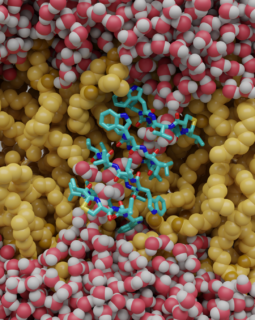DFG Funds Research on Lugdunin: Collaboration Between FAU Erlangen-Nürnberg and University of Göttingen Explores Selectivity of an Antimicrobial Peptide
The German Research Foundation (DFG) has approved funding for the research project: „Unraveling the Membrane-Selective Mechanism of Lugdunin: Insights into Specificity for Gram-Positive Bacteria and Antimicrobial Activity.“ This study is an interdisciplinary collaboration between the Computational Biology group at Friedrich-Alexander-Universität Erlangen-Nürnberg, led by Prof. Dr. Rainer Böckmann, and the group of Prof. Dr. Claudia Steinem at the University of Göttingen.
Focus on the Membrane-Selective Mechanism of Lugdunin
The project aims to investigate the membrane-selective mechanism of Lugdunin, a cyclic heptapeptide produced by Staphylococcus lugdunensis. Lugdunin exhibits remarkable activity against multi-resistant gram-positive bacteria while showing no toxic effects on gram-negative bacteria or human cells. Previous studies suggest that Lugdunin disrupts the membrane potential of pathogens such as Staphylococcus aureus by making the membrane permeable to protons—a mechanism that remains only partially understood.
Interdisciplinary Approach to Molecular Mechanism Research
The specificity of Lugdunin for gram-positive bacteria is hypothesized to result from their unique membrane lipid composition, which facilitates the peptide’s integration and antimicrobial activity. To unravel this mechanism, the study combines cutting-edge experimental and computational methods. Prof. Steinem’s group in Göttingen brings expertise in in vitro analysis of model membranes, while Prof. Böckmann’s team in Erlangen employs molecular dynamics simulations. Together, the teams investigate the interactions of Lugdunin with membranes that mimic the characteristics of gram-positive, gram-negative, and eukaryotic cells.
The project aims to identify the molecular interactions and structural determinants underlying the antimicrobial activity and membrane selectivity of Lugdunin. These findings could pave the way for the development of novel antimicrobial peptides and innovative approaches to combat infections caused by multi-resistant bacteria.
Collaborative Research Strengthens Antimicrobial Science
The collaboration between FAU Erlangen-Nürnberg and the University of Göttingen represents a significant step toward addressing fundamental questions in antimicrobial research. The DFG’s funding highlights the importance of this project in the global fight against multi-resistant bacterial infections while offering new therapeutic perspectives.
